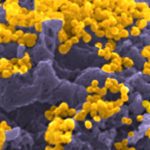Lien vers Pubmed [PMID] – 20882016
Nature 2010 Sep;467(7315):591-5
During immune responses, antibodies are selected for their ability to bind to foreign antigens with high affinity, in part by their ability to undergo homotypic bivalent binding. However, this type of binding is not always possible. For example, the small number of gp140 glycoprotein spikes displayed on the surface of the human immunodeficiency virus (HIV) disfavours homotypic bivalent antibody binding. Here we show that during the human antibody response to HIV, somatic mutations that increase antibody affinity also increase breadth and neutralizing potency. Surprisingly, the responding naive and memory B cells produce polyreactive antibodies, which are capable of bivalent heteroligation between one high-affinity anti-HIV-gp140 combining site and a second low-affinity site on another molecular structure on HIV. Although cross-reactivity to self-antigens or polyreactivity is strongly selected against during B-cell development, it is a common serologic feature of certain infections in humans, including HIV, Epstein-Barr virus and hepatitis C virus. Seventy-five per cent of the 134 monoclonal anti-HIV-gp140 antibodies cloned from six patients with high titres of neutralizing antibodies are polyreactive. Despite the low affinity of the polyreactive combining site, heteroligation demonstrably increases the apparent affinity of polyreactive antibodies to HIV.

